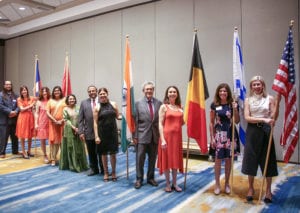
This year’s recipients of the MOSAIC awards pose by the flags of their native countries. The flags of the United States and Israel were paraded with the other banners. (photo provided by the Jewish Family & Career Services)
Fred Gross was a young newspaper reporter working at the New Haven (Connecticut) Journal Courier in 1966 when he got a phone call from some local “back activists.”
They invited Gross to a meeting at a public housing project in the middle of the night, where they would make plans for a new organization called the Progressive Democrats. Their goal was to end what they perceived as “evils in the city’s political system.”
Gross covered their efforts.
“They asked me to write some stories about what
they wanted to do,” Gross recalled. “There were 30 members on the city council and none of them were black.”
Forty-five years later, one of those activists said, “Fred Gross gave us voice, for which I remain grateful.
Gross was one of the five recipients of this year’s MOSAIC Awards, an annual salute by the Jewish Family & Career Services (JFCS) to first-generation Americans who have made a contribution to their professions and to their community. The awards were presented Thursday, May 23, during a dinner at the Marriott Hotel.
In addition to his work as a journalist, Gross, a
native of Belgium, has spent the last 18-25 years traveling across Kentucky, speaking to school children about his experiences as a Holocaust survivor.
During that time, “I have never encountered any kind of anti-Semitism in all the schools I’ve spoken,” he said, “and I have spoken in the hollers, in rural and urban areas. I was welcomed all the time.”
The other recipients were Purna Veer (India) an entrepreneur and head of the software company V Soft Consulting Group Inc.; James Racine (Haiti), a teacher, musician, host of the Books and Barbershops series and a faculty member at Kentucky Country Day; Keisha Deonarine (Trinidad & Tobago) a single mom and executive director of the Passport Foundation, a community-based health plan administering Kentucky Medicaid benefits; and Surekha Kulkarni (India), founder and executive director of the nonprofit Beaded Treasures Project, which has trained 300 disadvantaged women to overcome barriers to success.
Defying a growing intolerance to refugees and immigrants in this country, some of the recipients used their acceptance remarks to tout their newcomer status as a badge of honor.
“We immigrants work hard for what we have,” Deonarine said, “and what we leave for our children.”
She said she uses her experiences as a first – generation American, and as a single mom who escaped an abusive marriage, to teach her kids that they “have the potential to do great things.”
Racine said refugees and immigrants often feel pressure “to be more American than people who were born here.”
A man closely identifying with his Haitian heritage, he said immigrants “strengthen and enrich American Iife.”
Kulkarni said she and her husband, Suhas Kulkarni, a 2011 MOSAIC recipient, came to this country for their children’s education. Today, their daughter, Nima Kulkarni, is the first Indian American elected to the Kentucky House of Representatives, serving District 40 in Frankfort.
Veer said when he first came to Louisville, he “fell in love” with the city and knew he wanted to establish his corporate headquarters here. My heart is in Louisville,” he said.
The MOSAIC Awards are sponsored by the Jewish Heritage Fund for Excellence, Kindred Healthcare, Heaven Hill and WILKY.
The awards themselves, all unique wood sculptures, were made by Matt Karr, a professional woodworker and principal bassoonist for the Louisville Orchestra. Deb Frockt, CEO of the JFCS, said what this year’s honorees, and other newcomers, have in common is their strength.
“Every day, I see people strong enough to ask for help,” she said. Providing help to them, in all aspects of life, is what JFCS has done since its early days working with Jewish immigrants.
She said the organization work puts into deeds the Jewish philosophy of welcoming the stranger.
“Because we were strangers in a strange land,” she added.


